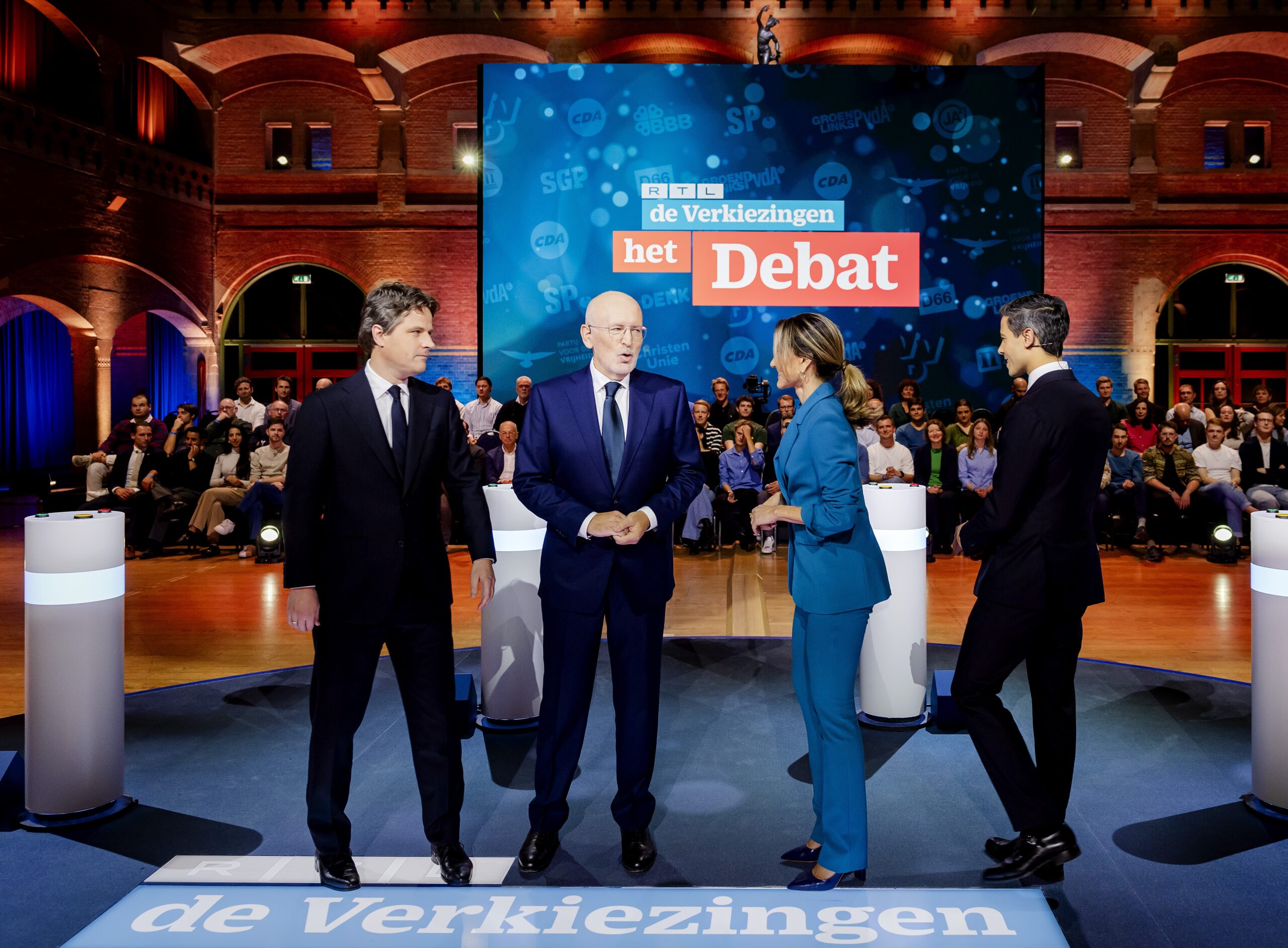Debate produces no clear winner as parties quibble over spending

The first televised leaders’ debate of the Dutch election campaign produced few flashpoints, as four parties who may end up forming a coalition together largely held back from making direct attacks.
The build-up to the debate, hosted by RTL, was dominated by the withdrawal of Geert Wilders, whose PVV party is leading opinion polls. He pulled out after reportedly being on the hit list of two suspected members of a Belgian jihadist terrorist cell who were arrested in Antwerp last week.
Despite the suspects being in custody, an assurance from the counter-terrorism body NCTV that there was no “residual threat” and offers to move the debate to a more secure location, Wilders – who had already pulled out of next weekend’s TV debate – said he was suspending his campaign because the threats gave him a “bad feeling”.
All four party leaders said they respected Wilders’ decision to put his own security first, while regretting the fact that they were unable to tackle him head-on about his party’s policies. “I hope there will be a moment in the coming days when we can debate with him,” CDA leader Henri Bontenbal said.
Timmermans was accosted in a café in Amsterdam a few hours before the debate by a man who screamed abuse and gave a Nazi salute as he was ushered out of the door by staff. “The social majority of good people is stronger. We will not let ourselves be intimidated,” Timmermans wrote on social media after the incident.
Asylum stalemate
In Wilders’ absence, Bontenbal took on GroenLinks-PvdA leader Frans Timmermans on immigration, asking why Timmermans was unwilling to take steps at national level to bring down the number of asylum seekers. “We can’t leave this subject to the parties on the flanks,” he said.
Timmermans said the main problem was an “accommodation crisis” that needed to be addressed through European measures and ensuring all local councils took in a fair share of refugees.
Yesilgöz, the leader of the right-wing liberal VVD, the only party that was in the last government, accused the other three of causing the stalemate.
“We’ve seen with the PVV walking out that they can’t solve the asylum problem, but these parties here don’t want to,” she said. “They’ve voted down all the firm measures that were proposed at national level.”
At times the debate was bogged down by discussions over the wording of the policy statements they were asked to agreed or disagree with rather than debating each other’s policies.
All four leaders agreed that the government should be trying to build 100,000 houses a year to fix the housing shortage, but only Jetten agreed with the proposal that the target figure should be binding.
Housing plans
The D66 leader used the opportunity to promote his party’s plans to build 10 new cities, arguing that other ideas such as making it easier to subdivide houses into apartments would enable him to reach the goal.
Jetten opened the show by immediately challenging Yesilgöz to a one-on-one debate on the economy. He accused the VVD leader of opening the door to Wilders and taking “extreme” positions on the environment, but failed to land any real punches as Yesilgöz countered with an attack on D66’s planned tax rises.
Jetten was the only one of the four leaders to oppose restricting numbers of labour migrants, arguing it would deter Dutch companies from recruiting “top talent” from abroad.
Timmermans was attacked for proposing to raise the minimum wage to stop the exploitation of migrant workers. Bontenbal said it would hit small businesses, while Yesilgöz accused GL-PvdA of using the business sector as a “cashpoint”.
Timmermans also came under fire on defence, after GroenLinks-PvdA would only commit to raising spending to match the new Nato limit up to 2030. Bontenbal challenged him on the “unpaid bill for €11 billion,” while Yesilgöz said Timmermans had “failed to show leadership.”
Timmermans and Bontenbal both said taxes would have to rise to pay for the additional defence spending, but the VVD say it should be offset by cuts in sectors such as healthcare, where it wants to raise the “own risk” contribution to health insurance from €385 a year to €440.
Netanyahu “war criminal”
The debate became most heated on the subject of Gaza, where Timmermans denounced Israeli prime minister Benjamin Netanyahu as a “war criminal” who should be put on trial “here in The Hague”, earning him loud applause from the studio audience.
Jetten said Yesilgöz’s party had been “radicalised” on the issue by opposing sanctions against Israel and treating injured Palestinian children in Dutch hospitals though the VVD eventually voted in favour of both measures.
D66 and GL-PvdA were both in favour of recognising a Palestinian state, while the CDA opposed the idea even though it was included in their manifesto. Bontenbal said recognition could only come once conditions had been met, such as excluding Hamas from power.
Thank you for donating to DutchNews.nl.
We could not provide the Dutch News service, and keep it free of charge, without the generous support of our readers. Your donations allow us to report on issues you tell us matter, and provide you with a summary of the most important Dutch news each day.
Make a donation